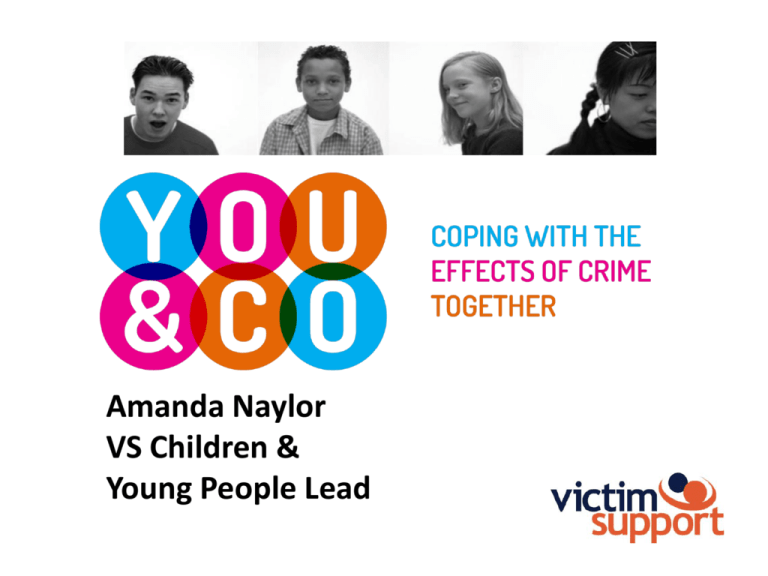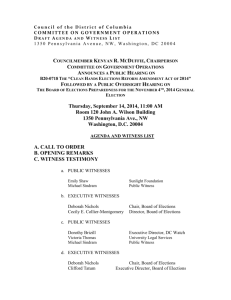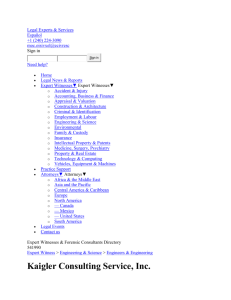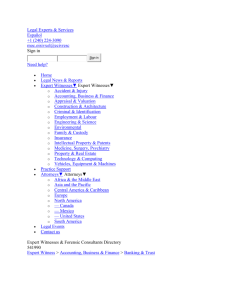presentation
advertisement

Amanda Naylor VS Children & Young People Lead AIMS To examine: • Recent cases & on-going poor experiences that CYP have in CJS • Policy initiatives/best practice examples (young witness services, special measures, and other support systems) • Specific role of the Intermediary and impact on CYP • How all professionals can play a key role in supporting young witnesses both in preparation and post trial. WHO IS VICTIM SUPPORT? Key agency that provides support at all ends of the Criminal Justice System Services include: • Core victim and witness support services • IDVA and ISVA teams • Specialist children’s sexual exploitation services • Specialist Young Witness Services WHY YOUNG PEOPLE NEED ADDITIONAL SUPPORT “Young victims and witnesses are amongst some of the most vulnerable users of the Criminal Justice Service. If victim and witness care is to be targeted at those with the greatest need this will almost always include young people.” Joint Inspection Report on the Experience of Young Victims and Witnesses in the Criminal Justice System, Feb 2012, HMCPSI, HMIC. WHO ELSE MAY BE INVOLVED WITH A WITNESS : • • • • • • • • • • • • • Family Police officer in Case Social Worker Witness Care Unit Witness Service Young Witness Service Intermediary Prosecution Barrister IDVA/ ISVA Specialist Organisation (Rape Crisis etc) Health Professionals Judge Usher BALANCING THE CJS AND YOUNG WITNESS NEEDS CJS YW 6 SAFEGUARDING V JUSTICE? Victims and witnesses, particularly those who are young and vulnerable: ‘continue to be adversely affected by an absence of real focus on their needs… the CJS system itself appears to be unable to maintain a consistent and acceptable level of care as cases pass through it’ (HM CPS Inspectorate and HM Inspectorate of Constabulary, Joint inspection report on the experience of young victims and witnesses in the CJS). 7 WHAT CHILDREN TELL US: • Everyone was making decisions about what I needed – I didn’t know really what was going on. Everyone said what I needed no-one asked me what I wanted • Being a witness re-traumatises and sometimes “feels worse than the abuse itself” • I didn’t understand any of the questions – it was like he was speaking another language • Everyone was happy that he was found guilty – I felt sad and lonely I just wanted it to stop. • After the trial everyone just disappeared – job done and I had to cope with what everyone had said about me and knew about me. Research Findings: 50% of young people do not understand some of the questions they are asked at court 65% experienced problems with comprehension or complexity of questions More than 50% of these young people did not tell the court of their difficulties More than 50% of young people report they were accused of lying 66% of young witnesses who gave evidenced were accompanied in the TV link room by a person they had not previously met 50% of young witnesses had a PTV, most did not have an opportunity to practice using the live link WHAT YOUNG WITNESSES WANT…. • • • • • • • • • to be taken seriously and told the truth to be told things that might go wrong at court to be able to trust the adult they spoke to to know the limits of confidentiality agreement to have a pre-trial visit before the day of court to be listened to on a one-to-one basis someone to answer questions and provide information the adult/professional to be available to them a non-judgemental and non-directive approach Plotnikoff and Woolfson (2004) In their own words. NSPCC HOW CAN YOUNG WITNESSES BE BEST SUPPORTED? Resilience Levels Risk factors • • Protective factors • Aim to reduce Risk factors Increase Protective factors Increase Resilience levels UNDERSTANDING SPECIAL MEASURES http://www.youandco.org.uk/courtroom AGREED MEASURES • • • • • • • • • • • VRI as evidence in chief No watching of VRI at court Registered intermediary Pre-recorded cross-examination No wigs and gowns Judge and counsel to meet witness Questions pre-submitted Topic cards for questions Face to face cross-examination Afternoon hearing Defendant not to see plasma screen INTERMEDIARIES “... as a result, a number of defendants have been prosecuted to conviction for committing very serious offences. The use of intermediaries has introduced fresh insights into the criminal justice process … They are independent and neutral. They are properly registered. Their responsibility is to the court. And they are used at much earlier stages in the process, to flag up potential difficulties in advance of the trial. … their use is a step which improved the administration of justice and it has done so without a diminution in the entitlement of the defendant to a fair trial. …. the use of intermediaries has meant that a number of those who are among the most vulnerable in the community may now be heard when before they would have been forced to remain silence.“ Rt Hon the Lord Judge, Lord Chief Justice 7.9.11 ENTITLEMENT TO A REGISTERED INTERMEDIARY Vulnerable witnesses (both prosecution and defence) under s16 of the 1999 Act Under 18 years of age; or where Quality of evidence may be affected by: mental disorder or impairment of intelligence and social functioning or physical disability/disorder. CPS GUIDANCE Special measures: Intermediaries should be considered in all cases of child sexual abuse, not just those involving very young witnesses, and if not involved earlier in the case, they should still be actively considered in advance of the trial as a means of supporting the victim giving evidence in court. Children and young people do not approach communication in the same way as adults and ability across all age ranges can vary considerably Para 85 CPS Guidelines on Prosecuting Cases of Child Sexual Abuse, Oct 13. JOINT INSPECTION REPORT DEC 2014 • No RIs were used in the 69 interviews, including 4 interviews of children under the age of 6. • RIs were not always sought because of “a tendency by some interviewers and their managers to over-estimate their own skill levels and/or underestimate the communication needs of vulnerable witnesses”. • At court, RIs were not used as much as expected where the issue was simply age of the child. • One court has made it clear they expect an RI assessment will be carried out on all children under twelve and that it should be mandatory for under nines. RECOMMENDATIONS • Recommendation 4: Police forces should ensure intermediaries are considered and used where appropriate; and the rationale and decision for their use . or not are recorded • Recommendation 5: The CPS should ensure intermediaries are considered for use at court in every case involving a child witness and a written record is maintained of the decision, particularly of the rationale where an intermediary is not used. Achieving best evidence in child sexual abuse cases – a joint inspection, HMCPSI, HMIC, December 2014 FINDING OUT MORE? www.theadvocatesgateway.org What goes wrong for CYP What is in place to ensure things improve What can you do to better support young witnesses WHEN THINGS GO WRONG • • • • • • • • • • • No advanced referrals No pre-trial therapy offered No Ground rules hearings No intermediaries Poor timetabling (double/triple listings/ floating trials) Special Measures not in place/ wrong special measures in place Unacceptable length of time in cross examination Aggressive cross examination/ multiple cross examination Media involvement No post trial support No co-ordination between agencies WHAT SHOULD IMPROVE THE EXPERIENCE FOR YOUNG VICTIMS/ WITNESSES IN CJS? Significant Progress across all agencies in working together to address gaps leading to: • Better understanding of the issues (OCC, SVACV) • Better identification of children and young people being sexually exploited (ACPO, Working Together, MASH) • More cases coming to court (CPS) • Wider range of Special Measures – better application • Training for key members of Judiciary, Prosecution (Advocates Gateway, Equal Treatment Bench book) • Clear information on entitlements (Victims Code, Witness Charter) TAILORING SUPPORT • Talk to the young person about special measures available and help them make informed decisions don’t assume • Risk, protective and resilience factors may fluctuate during criminal proceedings – re-assess needs • Ask person about condition, triggers, coping strategies and support needs • Prepare and plan together for possible reactions Remember It is important that you tell the truth at court If you cannot remember - say you cannot remember If you need to – say you want to hear a question again If someone says something not true - say it is not true EXAMPLES OF ‘GROUND RULES’ WORKING WITH OTHER AGENCIES Key Multi Agency Processes: • • • • • • • Avoid duplication and ownership (my witness) Professional Respect Information Sharing Skill Matching – right person provides the support Joint Planning Advocacy Little things matter LEGISLATION, STANDARDS & GUIDANCE – FURTHER READING • Youth Justice & Criminal Evidence Act 1999 Introduction of Special Measures • Achieving Best Evidence in Criminal Proceedings 2011 National Standards for Child Witness Preparation • Young Witness Handbook 1998/Young Witness Pack • Registered Intermediary Procedural Guidance Manual 2012 • Victims Code/Witness Charter • Equal Treatment Benchbook 2013 • Advocates Gateway • CPS ACPO Guidance 2013 (CSE) • Joint Inspection Report Achieving best Evidence in CSA cases 2014 • Criminal Practice Directions 2015 Amanda Naylor youandco@victimsupport.org.uk http://www.youandco.org.uk






